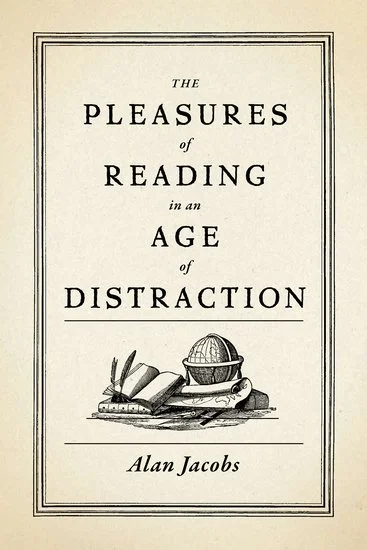The Pleasures of Spiritual Companionship in an Age of Distraction
Now that I’m no longer spending my summers crafted or editing syllabi, reading new texts that I’ll assign in for the Fall term, or scrambling to write conference papers or articles before the humdrum of the school year begin, I’ve rediscovered reading for pleasure. Among the books I’ve picked up is Alan Jacobs’ The Pleasures of Reading in an Age of Distraction. Jacobs is a seasoned and prolific writer; his many books and articles (check out The Book of Common Prayer: A Biography) and author of a great blog- blog.ayjay.org. Anyway, The Pleasures of Reading is a great little book, mostly anecdotal. Jacob’s shares personal correspondence, reflections on his many years as a reader, writer, and professor of literature. But along the way, we pick up that Jacobs is also quite the anthropologist. He understands the human condition from the particular perspective of humans as literate beings.
Despite testimony to the contrary, yes, it is possible to enjoy reading.
Early in the book, Jacobs tells his readers about How to Read a Book, a book by Mortimer Adler and Charles Van Doren. Adler, we learn, lamented the consumerist approaching to learning at the expense of training people to really understand, to become people of understanding. I was drawn to this lament, and it reminded me of the old adage, “Give a man a fish and you feed him for a day. Teach him how to fish and you feed him for a lifetime.” Reflecting on Adler’s complaint in my own context, I can’t help but smile ruefully. The University has become the equivalent of a fish market.
Maybe eight or nine years ago, I had the opportunity to hear Rowan Williams give a talk at an Orthodox seminary north of the NYC. In the Q&A that followed, Williams was asked by an Orthodox bishop what he advice he would give to an Anglican priest who was considering the episcopacy (a.k.a becoming a bishop). Williams responded, “I would ask them if they have a spiritual director, and if they didn’t I’d tell them to get one.” In that moment, I marveled at that advice. But now, I am beginning to see more clearly its wisdom. What everyone needs—from the seeker to the average Christian to the Christian leader—is not simply good advice, but rather the resources to grow, to mature in a sustainable and ongoing way. A good spiritual director won’t just give you a couple spiritual moves that you can repeat for a while until you get bored. Rather, hopefully, they will help you examine yourself, your habits and postures, in such a way that you can discover and judge for yourself new spiritual practices, cope with new spiritual difficulties, and maybe even walk alongside others as they deal with their own spiritual challenges.
So, if I understood +Rowan right, a good spiritual director is a bit like Mr. Miyagi in the Karate Kid: at the end of the day, all those chores (wax on/wax off) equipped Daniel to face the richness and complexity of life (and the occasional Cobra Kai enemy) on his own.
When I think about the work of a college chaplain, I envision someone a bit less enigmatic and a lot less physical than Mr. Miyagi, but the principle remains. What people need, what I need, is not a spiritual boss to tell them what to do, how to vote, what to eat, drink, or wear. Instead, what we all need is help and companionship in discerning and living out God’s call for each one of us. In fact, it’s not just the chaplain’s work, but rather it’s up to all of us to equip each other, through the grace of God, to love God with our whole hearts, minds, and strength, and to love our neighbors as ourselves. This is the most crucial, most vital work that we can do. We must set ourselves to it with our whole being.
And, of course, this is the most difficult work that we could set ourselves to, a difficulty that is heightened by the tensions, personalities, and complications that college life brings. Loving our neighbors (a.k.a. roommates, coworkers, teammates, professors, administrators) is almost never easy. Loving ourselves, likewise, can be challenging, especially when we let ourselves and each other down. It can be easy to judge ourselves and each other by the standards of the world, by our material successes and failures, by whether or not someone lives up to our expectations, rather than seeing ourselves as Jesus sees us, as made in his image, as worthy of love, forgiveness, and redemption, as part of God’s plan to save the world.
If we can learn to see ourselves and each other not according to the world’s perception but as Jesus sees us, we will have taken a very big step toward equipping ourselves to do this work that God calls us to do.
Dan+


